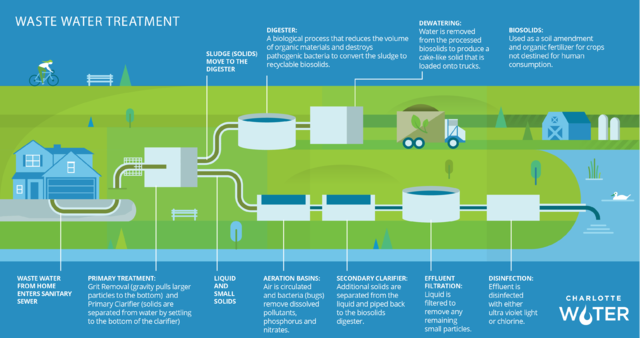Wastewater Systems: Difference between revisions
mNo edit summary |
mNo edit summary |
||
| (4 intermediate revisions by the same user not shown) | |||
| Line 1: | Line 1: | ||
{{IRL header}} | <div class="irlbody"> | ||
= | {{IRL header estuary|cat=Estuary|toc=no}} | ||
<div class="irlcontenttop"> | |||
Most homes and businesses send their wastewater to a treatment plant where many pollutants are removed from the water. Wastewater treatment facilities in the United States process approximately 34 billion gallons of wastewater every day. Wastewater contains nitrogen and phosphorus from human waste, food and certain soaps and detergents. Once the water is cleaned to standards set and monitored by state and federal officials, it is typically released into a local water body, where it can become a source of nitrogen and phosphorus pollution. | Most homes and businesses send their wastewater to a treatment plant where many pollutants are removed from the water. Wastewater treatment facilities in the United States process approximately 34 billion gallons of wastewater every day. Wastewater contains nitrogen and phosphorus from human waste, food and certain soaps and detergents. Once the water is cleaned to standards set and monitored by state and federal officials, it is typically released into a local water body, where it can become a source of nitrogen and phosphorus pollution. | ||
| Line 6: | Line 7: | ||
Our sewer and septic systems are responsible for treating large quantities of waste, and these systems do not always operate properly or remove enough nitrogen and phosphorus before discharging into waterways. | Our sewer and septic systems are responsible for treating large quantities of waste, and these systems do not always operate properly or remove enough nitrogen and phosphorus before discharging into waterways. | ||
</div> | |||
<div class="irlcontentmiddle"> | |||
[[File:Wastewater_Treatment_Infographic.png|640px|center|frameless|alt=Wastewater Treatment Infographic|Wastewater Treatment Infographic]] | |||
</div> | |||
<div class="irlcontentmiddle"> | |||
===Wastewater Treatment Plants=== | ===Wastewater Treatment Plants=== | ||
{{#ev:youtube|b6WLd0tlesE|320|right}} | {{#ev:youtube|b6WLd0tlesE|320|right}} | ||
| Line 11: | Line 17: | ||
Some wastewater treatment plants are able to remove more nitrogen and phosphorus from their discharges than others depending on their equipment and how they treat wastewater. Enhanced treatment systems enable some wastewater plants to produce discharges that contain less nitrogen than plants using conventional treatment methods. Upgrading wastewater treatment systems is often expensive for municipalities and rate payers, but upgrades can pay for themselves or end up saving a plant money. Various strategies to reduce nitrogen and phosphorus loads from wastewater treatments plants are being pursued across the country. | Some wastewater treatment plants are able to remove more nitrogen and phosphorus from their discharges than others depending on their equipment and how they treat wastewater. Enhanced treatment systems enable some wastewater plants to produce discharges that contain less nitrogen than plants using conventional treatment methods. Upgrading wastewater treatment systems is often expensive for municipalities and rate payers, but upgrades can pay for themselves or end up saving a plant money. Various strategies to reduce nitrogen and phosphorus loads from wastewater treatments plants are being pursued across the country. | ||
{{IRL footer}} | </div> | ||
[[Category: | {{IRL footer estuary|cat=Human Impact}} | ||
</div> | |||
[[Category:Human Impact]] | |||
Latest revision as of 05:25, November 23, 2021
Most homes and businesses send their wastewater to a treatment plant where many pollutants are removed from the water. Wastewater treatment facilities in the United States process approximately 34 billion gallons of wastewater every day. Wastewater contains nitrogen and phosphorus from human waste, food and certain soaps and detergents. Once the water is cleaned to standards set and monitored by state and federal officials, it is typically released into a local water body, where it can become a source of nitrogen and phosphorus pollution.
Some wastewater treatment plants are able to remove more nitrogen and phosphorus from their discharges than others depending on their equipment and how they treat wastewater. Enhanced treatment systems enable some wastewater plants to produce discharges that contain less nitrogen than plants using conventional treatment methods. Upgrading wastewater treatment systems is often expensive for municipalities and rate payers, but upgrades can pay for themselves or end up saving a plant money. Various strategies to reduce nitrogen and phosphorus loads from wastewater treatments plants are being pursued across the country.
Our sewer and septic systems are responsible for treating large quantities of waste, and these systems do not always operate properly or remove enough nitrogen and phosphorus before discharging into waterways.
Wastewater Treatment Plants
Most homes and businesses send their wastewater to a treatment plant where many pollutants are removed from the water. Wastewater treatment facilities in the United States process approximately 34 billion gallons of wastewater every day. Wastewater contains nitrogen and phosphorus from human waste, food and certain soaps and detergents. Once the water is cleaned to standards set and monitored by state and federal officials, it is typically released into a local water body, where it can become a source of nitrogen and phosphorus pollution.
Some wastewater treatment plants are able to remove more nitrogen and phosphorus from their discharges than others depending on their equipment and how they treat wastewater. Enhanced treatment systems enable some wastewater plants to produce discharges that contain less nitrogen than plants using conventional treatment methods. Upgrading wastewater treatment systems is often expensive for municipalities and rate payers, but upgrades can pay for themselves or end up saving a plant money. Various strategies to reduce nitrogen and phosphorus loads from wastewater treatments plants are being pursued across the country.

